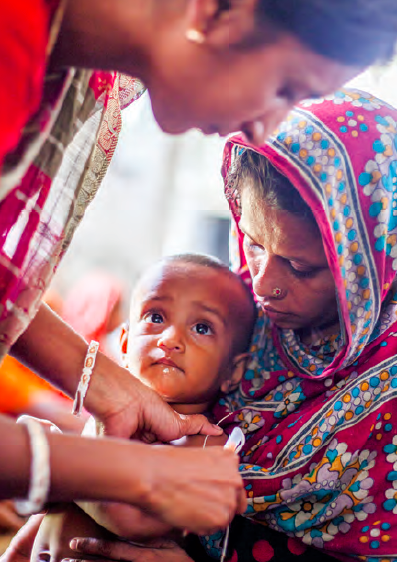Perceptions of severe acute malnutrition and its management in infants under six months of age: An exploratory study in Bangladesh
 Yasir Arafat1is a medical doctor and public health practitioner, managing community-based nutrition programmes targeting acute malnutrition. He is currently working with Save the Children in Bangladesh
Yasir Arafat1is a medical doctor and public health practitioner, managing community-based nutrition programmes targeting acute malnutrition. He is currently working with Save the Children in Bangladesh
Background
Acute malnutrition (or wasting) among infants under six months of age has been a neglected area, despite the fact that younger infants are at greater risk of death than older children. Save the Children is conducting research on the management of acute malnutrition in infants (MAMI) in Bangladesh with the aim of providing evidence for the management of this condition. In partnership with the ENN and the London School of Hygiene and Tropical Medicine (LSHTM), a community-based tool for the management of acute malnutrition in infants (C-MAMI) is being developed to provide health workers with guidance to identify, assess and manage acutely malnourished infants in the community.
Bangladesh is very committed to providing nutrition services through existing Ministry of Health district services, although the concept of providing nutrition services through community health workers (CHWs) is new. For example, community-based management of acute malnutrition (CMAM), despite being well known in the sector, is not yet being implemented at scale. CHWs do provide vaccination and family planning support door-t-door in villages, although these staff are not trained to identify acute malnutrition and are generally perceived as being unqualified to provide any special nutritional care.
Methods, findings and conclusions
An exploratory study carried out in 2015 in the Barisal district in Bangladesh involved semi-structured, in-depth interviews with caregivers (mothers, fathers, grandparents and other influential people) of infants under six months of age and focus group discussions with CHWs and those working at the Barisal Medical College Hospital. Interviews captured the views, experiences and preferences in care of infants with severe acute malnutrition (SAM). It was found that malnutrition in infants under six months of age (known locally as opusti) is perceived as a common problem in the community. The lack of a nutritious diet, insufficient or no breastfeeding and repeated illness were cited as the most frequent causes. Early marriage and maternal malnutrition were also mentioned among other common causes of malnutrition in infancy.
Symptoms associated with SAM include thinness, restless sleep, crying, the inability to breastfeed and illnesses like fever and cough. Mothers reported that they were most likely to chose to go to CHWs, use home-based nutritious foods, juices and keep the baby warm. Carers, including grandparents and fathers, were more likely to report going to traditional healers. Given the experience of door-to-door visits from CHWs for other health-related activities, home visits were cited as an appropriate way of monitoring growth in infants.
While community-based treatment was identified as a lowcost care option, not having a doctor in community clinics to diagnose and ensure the appropriate management for recovery was identified as a risk. In-patient treatment was perceived to be a better care option because of the presence of doctors and 24/7 care availability. Caregivers who reported having experience of visiting these health services were in favour of home-based management options as soon as their infant had overcome the most critical period, so as not to have to spend so much time away from home.
Communities felt that supporting the mother while she cared for a malnourished infant was just as important as caring for the infant. This notion of wellbeing was extended to support for decision-making on whether to take an infant presenting symptoms identified with SAM to the nearest government facility or to treat the infant at home.
Training of caregivers and health workers was cited as a way forward where there is no availability of qualified medical staff at community level. Mothers also reported being confident in taking care of their infants if they were taught to provide better home-based care. They expressed a preference for in-patient care in hospitals only when there was no other option due to the seriousness of the health status of the infant.
The study indicates that there is a preference for community based, mother-infant care options due to the issues of access to in-patient care and because of trusted community support mechanisms. Early diagnosis and treatment of SAM at home through reinforcement of a community-based approaches based on early detection may be a way forward.
1Contributions to this article came from G. Mothabbir at Save the Children in Bangladesh, N. Connell at Save the Children USA, M. Kerac at the London School of Hygiene and Tropical Medicine and MM. Islam at the International Centre for Diarrhoeal Disease Research.
References
http://www.ennonline.net/c-mami
Contributions to this article came from G. Mothabbir at Save the Children in Bangladesh, N. Connell at Save the Children USA, M. Kerac at the London School of Hygiene and Tropical Medicine and MM. Islam at the International Centre for Diarrhoeal Disease Research.
